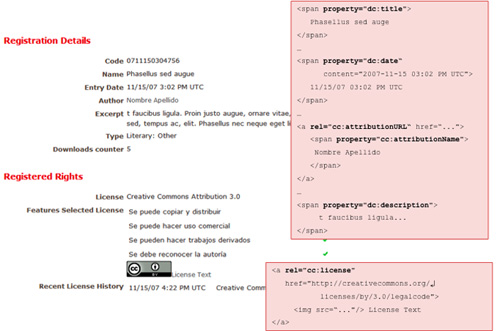SafeCreative.org gives semantic web adapted tags with ccREL
Several weeks ago, the html code we use in our tags at SafeCreative.org after blog and individual works registrations, aswell as the pages where registration details get explained when creative commons licenses are used (http://www.safecreative.org/work/numberofwork), is adapted to the semantic web. This code incorporates the Creative Commons, under W3C standards, ccREL tagging.
This means that humans, aswell as machines, get the same information with the same page’s xhtml code. Thanks to RDFa standards which clearly define what kind of information is beeing given in each part of the page, machines understand if what they are reading is the work’s title, author’s name, kind of license, etc.

This standard proposed by Creative Commons thanks to the work of Nathan Yergler, Ben Adida, and many others, tries to provide open and accesible tools to foster the use of open licenses in the future semantic web environment; a space in which giving relevant and segmented information to search engines is vital.
Thanks to this coding, search engines can easily locate work’s information to correctly index each data whithin the license explanation page. For instance, Google, leading search engine, will find, index and provide better results with greater ease, because will be able to deliver the correct search result by giving the relevant information the user was looking for.
Another advantage is that thanks to this standarized way to give information for both humans and machines at the same tame, other web applications might use the same code to easily interact. The information can be used and understood directly with no need for mechanical procedures to identify anything. The work’s information is allways identificable. This is specially usefull for 2.0 webs.
The use of ccREL gives a clear benefit to those users that really want to be known in the Internet. We recommend everybody to update their blog’s SafeCreative tag so they have the most updated code in it. And of course, to keep on registering works so that search engines will correctly index them.
